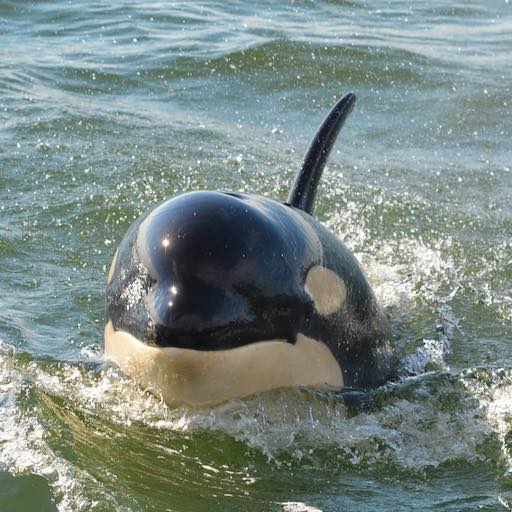forum
library
tutorial
contact

Groups Sue NOAA to Compel the Agency to Assess,
Reduce Impact of Salmon Harvests on Orcas
by StaffColumbia Basin Bulletin, April 8, 2019
|
the film forum library tutorial contact |

|
Groups Sue NOAA to Compel the Agency to Assess,
by Staff |
Chinook salmon are important to the Southern Resident's survival and recovery, and any activities that affect the abundance
of those salmon available to the whales have the potential to impact the survival and population growth of the whales.
 Two conservation groups have sued NOAA Fisheries to make the agency revisit its 2009 decision finding that commercial and recreational fisheries did not jeopardize survival of Southern Resident killer whales.
Two conservation groups have sued NOAA Fisheries to make the agency revisit its 2009 decision finding that commercial and recreational fisheries did not jeopardize survival of Southern Resident killer whales.
The Center for Biological Diversity and Wild Fish Conservancy sued NOAA April 3 in the U.S District Court, Western District of Washington, for what they say is mismanagement of West Coast salmon fisheries and harming the critically endangered Orcas.
The suit seeks to compel NOAA to assess and reduce the threat to the endangered orcas from salmon fishing off Washington, Oregon and California. Southern Residents are also threatened by pollution and disturbance from vessel traffic, the groups said in a news release.
"While orcas starve to death, the Trump administration is refusing to protect salmon populations crucial to their survival," said Julie Teel Simmonds, a Center for Biological Diversity attorney. "Salmon and the killer whales that rely on them are both in trouble, and this fishery must be better managed to promote their recovery. If federal officials don't act now, we'll lose our chance to pull these beloved animals back from the edge of extinction."
The complaint is here
NOAA already reopened consultation on fisheries last month. In a March 6 supplemental guidance letter to Phil Anderson, chair of the Pacific Fishery Management Council, Barry Thom, NOAA West Coast regional administrator, said the agency is reopening consultation with PFMC on fisheries' impacts on the Orca whales, which are listed as endangered under the federal Endangered Species Act.
PFMC is meeting this week (April 9 – 16) in Rohnert Park, California to set spring and summer fisheries off the West Coast.
In the last 10 years, the population of the whales has declined from 87 to an historical low of 74, and projections show a further decline in the future, Thom's guidance letter said.
NOAA, along with the state of Washington, is taking a number of actions to conserve and recover the killer whales by addressing the three main threats to their existence: a declining number of chinook salmon, vessel traffic and noise, and chemical contaminants.
Researchers have been closely watching two ailing orcas that appear to be malnourished, the groups said. Starving orcas show signs of "peanut head" – a condition in which an individual has lost so much body fat that a depression appears behind its blowhole.
In January 2019 scientists confirmed the birth of a baby orca named Lucky. The first calf to survive past birth since 2015, Lucky underscores the urgent need to improve feeding opportunities for Southern Resident killer whales, they said.
Lucky and its pod were sighted in early April in Monterey Bay on the northern California coast. Its location highlights "the expansive range of the Southern Resident killer whales (which feed in the summer in Washington's Puget Sound) and the importance of protecting the salmon they eat throughout their range," the groups said.
Chinook salmon are important to the Southern Resident's survival and recovery, Thom had said in his guidance letter, and any activities that affect the abundance of those salmon available to the whales have the potential to impact the survival and population growth of the whales.
Kurt Beardslee, executive director of the Wild Fish Conservancy, said that the federal government "can no longer ignore the scientific evidence that clearly demonstrates the link between reduced size and abundance of chinook and the reduced reproductive success of Southern Resident killer whales."
In August 2018 the Center sued NOAA for what they said is the agency's failure to protect the Orca's full West Coast habitat. Also in August, the Center sued NOAA to establish a "whale protection zone" to shield orcas from boat noise and disturbance in the heart of their Puget Sound habitat.
This most recent lawsuit focuses on what the groups say is NOAA's obligation under the ESA "to ensure that the Pacific Coast salmon fisheries do not jeopardize the Southern Resident killer whales. That includes a requirement to use the best available science on orcas to manage the salmon fishery."
Simmonds said that NOAA has relied on decade-old science to maintain the status quo in the Pacific salmon fisheries while these orcas are starving.
"It's not right, and it's not what the Endangered Species Act calls for," he said. "West Coast orcas can't afford another year without bold federal action based on sound science to reverse their decline."
The Center for Biological Diversity is a national, nonprofit conservation organization with more than 1.4 million members and online activists dedicated to the protection of endangered species and wild places, the Center said.
The Wild Fish Conservancy is a nonprofit conservation ecology organization headquartered in Washington State and dedicated to preserving, protecting and restoring the Northwest's wild fish and the ecosystems they depend on, through science, education and advocacy.
learn more on topics covered in the film
see the video
read the script
learn the songs
discussion forum
